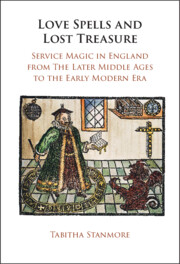 Love Spells and Lost Treasure
Love Spells and Lost Treasure Published online by Cambridge University Press: 06 January 2023
Magic is a constant across the world and throughout time. The place it inhabits in society and how those who practise it are treated are the variables; its presence is never a novelty. While witchcraft is recognised as a phenomenon of the medieval and early modern periods, service magic – performed to a useful end in exchange for a fee, and more common than witchcraft – has been overlooked. This book gathers over 700 instances of magic use in England between the fourteenth and seventeenth centuries to demonstrate the entrenched nature of service magic in premodern society, and explore how it was perceived and incorporated into daily life. Service magic was well established by the time of the witch trials, and was recognised as a useful tool from at least the fourteenth century. It was used to meet needs that nothing else could address, like healing the chronically sick, finding lost goods, ending poverty by locating buried treasure, and kindling love. Though its use was technically illicit, first treated as a moral crime and then a secular one from the mid-sixteenth century, for most people magic was an accepted and even welcome aspect of everyday life.
To save this book to your Kindle, first ensure [email protected] is added to your Approved Personal Document E-mail List under your Personal Document Settings on the Manage Your Content and Devices page of your Amazon account. Then enter the ‘name’ part of your Kindle email address below. Find out more about saving to your Kindle.
Note you can select to save to either the @free.kindle.com or @kindle.com variations. ‘@free.kindle.com’ emails are free but can only be saved to your device when it is connected to wi-fi. ‘@kindle.com’ emails can be delivered even when you are not connected to wi-fi, but note that service fees apply.
Find out more about the Kindle Personal Document Service.
To save content items to your account, please confirm that you agree to abide by our usage policies. If this is the first time you use this feature, you will be asked to authorise Cambridge Core to connect with your account. Find out more about saving content to Dropbox.
To save content items to your account, please confirm that you agree to abide by our usage policies. If this is the first time you use this feature, you will be asked to authorise Cambridge Core to connect with your account. Find out more about saving content to Google Drive.